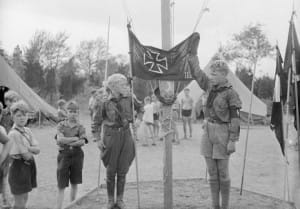Though America is best known historically for its ties to Britain, this country is heavily influenced by its German immigrants and I don’t imagine that most of them were thrilled when America went to war twice with Germany.
American Nazi sympathists were certainly not unheard of during the Third Reich, but it can be shocking to see how established and organized they could be. Camp Siegfried was a bucolic bit of land in Yaphank, New York, a sleepy Suffolk County hamlet in eastern Long Island. It was established as an actual American Nazi summer camp in 1935 by the “Friends of New Germany”—an organization that became the German American Bund (American Nazis) just a year later in 1936. Many similar camps existed across the U.S. throughout the 1930s—Wisconsin, Pennsylvania and New Jersey were all home to large Bund camps. As you’d expect, the “campers” were a reactionary German Americans, vehemently opposed to socialism, unionism and even the reforms of The New Deal.Publicly, the Bund behaved as if their American citizenship was not in conflict with their Germanophilia and Nazism, even flying the stars and stripes above the Nazi flag at their camps. In a stunning feat of rationalization, they argued that George Washington was actually the “first Fascist.” These gestures did little to assuage the fears of authority; the eerie, militarist images you see here were mostly taken by the NYPD, who was keeping a close eye on all Nazi-affiliated activity, and for good reason. In ‘39 the Bund led a Nazi rally at Madison Square Garden that attracted roughly 20,000 Nazis and about 80,000 others. About 200 socialists attempted to disrupt the rally and the ensuing riots were met with 1,745 policeman—more cops than had ever been utilized for a single event in NYPD history.
Camp Siegfried was (finally) forcibly closed in 1941, when Germany formally declared war on the U.S. and allegiance to Hitler was no longer protected as free speech. Bund leader and naturalized citizen Fritz Julius Kuhn was imprisoned for tax evasion and embezzling from the Bund (they never wanted to prosecute him, the charges were apparently just an excuse to attack the organization). Without their camps or their leader, and facing increasing animosity from Nazi-hating Americans, the Bund withered.
I wonder how acceptable it was to be a Nazi in America in the 1930s? As opposed to being a Jew in America? As opposed to being a Japanese nationalist in America? It appears that you could be a Nazi sympathizer in America in the 1930s and gather with other Nazi sympathizers and the world didn’t crash down upon your shoulders.
What I find most interesting from the article is this sentence: “Publicly, the Bund behaved as if their American citizenship was not in conflict with their Germanophilia and Nazism, even flying the stars and stripes above the Nazi flag at their camps.”
It reminds me of the struggles American Jews have had in justifying and explaining their loyalties to their fellow Jews around the world and to the Jewish state of Israel with their American citizenship.
As a Jewish nationalist, I feel like I have easy access to the thinking and practices of other nationalists, be they Germans, Nazis, whites, asians, Japanese, blacks, etc.
Chaim Amalek: “Luke, apart from his antisemitism and declaration of war on the United States, was there anything about Hitler that you don’t approve of?”
Luke: “I think his actions from September 1939 onward were a disaster for Germany, for Jews, for Europeans, and for nationalists.”
The great moral downside of strong in-group identity (such as what the WWII Germans and Japanese possessed) is that out-groups may get slaughtered. I don’t think you can build a widespread and deep in-group identity without also building hostility to out-groups and this theorem applies to Jews as much as it does to non-Jews.
Chaim Amalek writes:
B’H’ for the atom bomb. Here, at least, on the morning of August 6, 1945, the Yidden (Oppenheimer, Szilard, Teller, etc.) were a very bright “light unto the world.”
When Moshiach comes, no one will have nuclear weapons but for us, and we will use them to perform dirt moving activities on the moon and Mars, where we will finally establish an independent homeland for those Palestinians who want one. But none of them will.
When Moshiach comes, David Letterman will have to stop with his ten best list, since every spot on it will be the same.
When Moshiach comes, dogs will use the toilets of the goyim and know how to flush them. But not in our homes, as Yidden will not sleep with or keep them.

